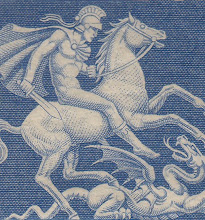Just imagine that the Conservative Party had held a leadership election in which there were four white male candidates and one female black candidate, and that the later candidate came bottom of the poll with a mere 7% of the overall vote and just 0.87% support from her fellow MPs.
Then imagine what all the Labour Party activists would be screaming about racism and sexism, about white male domination, about being unrepresentative of the country as a whole.
Stretch you imagination still further, and think about a Conservative Party, where in addition to MPs and Party Members getting a vote, representatives of the businesses in this country also got a vote. Now just go that little bit further still, and imagine what would be said if the eventual leader was elected, not by a majority of MPs and Party Members, who preferred another candidate, but by big business.
This is effectively what the Labour Party has just done, if you substitute the words "Trade Unions" for "Big Businesses"!
They have rejected the only female candidate, who happened to be black, and the choice of the MPs and Party Members was over-ruled by the Trade Unions.
White male dominated, controlled by the Trade Unions, and totally unrepresentative of the country as a whole.
The Tories now have some good ammunition, let's hope they use it when necessary.
Climate Faithful Admit Need for Fossil Fuels
3 hours ago


Except that more trade unionists voted than members and MPs/MEPs combined. It's actually quite enlightening if you ignore the weighting given by the electoral college (where 200 MPs get as big a share of the vote as 200,000 trade unionists) and look at the simple total number of votes cast for each candidate. In the first round:
ReplyDeleteEd Miliband – 125,649 (37.1%)
David Miliband – 114,205 (33.8%)
Diane Abbot – 35,259 (10.4%)
Ed Balls – 34,489 (10.2%)
Andy Burnham – 28,772 (8.5%)
And in the final round:
Ed Miliband – 175,519 (54.4%)
David Miliband – 147,220 (45.6%)
If the Tory Party opened up its leadership election to, let's say, all business owners (not just big business), and the number of those voting far exceeded the number of rank-and-file Conservative Party members voting, wouldn't you argue that that was in fact much broader and more represenative than leaving the decision to the rank and file alone?
And note that Diane Abbot actually came third in terms of the total number of votes cast, narrowly beating Ed Balls. I think that's relatively healthy.
Your argument about the Trade Unions would be more logical if the individual members had a vote. I used to belong to a Trade Union, but I never had a personal vote, and I can never remember being asked by the Union for my views,even as a local official (perhaps because everyone knew that I was a right wing Tory!).
ReplyDeleteThe individual members of the Trade Unions do have a vote - ballots were sent to every member of the union and returned by them to the voting organisation running the leadership election (or, they used the unique reference number on their ballot to vote on-line).
ReplyDeleteThe union "block" vote was absolished two decades go - perhaps that was after you ceased to be a union member, though. (However, you should still have had a personal vote even back then - most unions gave their members a vote on who to support, the scandal was that it was a winner-take-all vote in the style of Amercan presidential primaries, so all of the votes for that union were then awarded to whichever candidate topped that union's poll as a single block.)
That being said, since the block vote was absolished circa 1990, and before 1980 the leader was only elected by the Parliamentary Labour Party, I think it was only Neil Kinnock who was elected leader in a contest using union block votes.
ReplyDelete